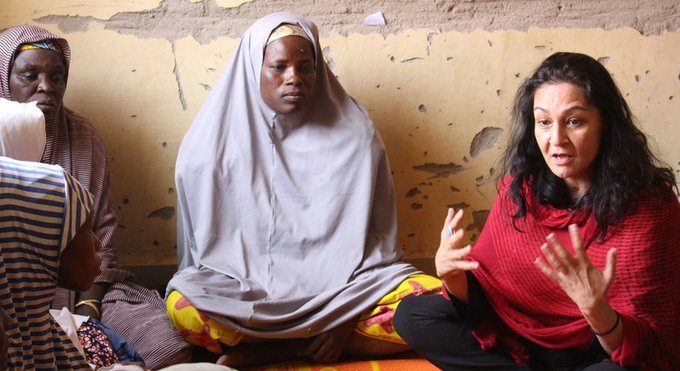
First Person: Finding new ways to save millions at risk during the coronavirus pandemic
New York/IBNS: Millions of people are reliant on humanitarian supplies to survive, and the COVID-19 pandemic is making it even more difficult for aid workers to reach them. The UN Office for the Coordination of Humanitarian Affairs (OCHA), is having to rethink the way it operates in some of the most vulnerable places in the world.
In a statement released on Friday, the UN said that aid efforts are being stepped up, with humanitarian workers installing handwashing stations, delivering clean drinking water and food, and launching public information campaigns. However, the UN’s humanitarian chief, Mark Lowcock, has warned that funding is urgently needed to battle COVID-19, and respond to the many other, pre-existing crises.
In this First Person account, Reena Ghelani, Operations Director for OCHA, explains that teams on the ground are adapting to the ‘new normal’, in a world fighting an unprecedented health threat.
At least 100 million at risk
“Our first priority from day one has been to ensure that humanitarian operations are sustained. We have estimated that, even before COVID-19 spread so widely, we needed to be able to reach 100 million people this year to ensure that they have lifesaving assistance and protection.
And now, with COVID-19, we need to make sure we can reach vast, vast numbers of other vulnerable people because, if we don't, the impact of the virus is going to be even worse.
So we have mobilized fast and we've mobilized as one with the United Nations and our NGO colleagues and partners: we've quickly identified the sorts of tools we will need to be able to reach deep into some countries where some of the most pressing needs and the most vulnerable people are, and we’ve set up a logistics operation through the World Food Programme (WFP), that will help us, while airlines are less able to enter countries, and governments are taking measures to protect their populations.
Aid workers save lives in developing countries and need to be able to move around as freely as possible. At OCHA, we need to have the infrastructure to support them to do that. Save the life-savers
With the pandemic, we have to operate differently, using different tools to assess situations and get assistance to people, and we are asking governments to help humanitarian workers to move around in a responsible manner, so that we can deliver assistance in a flexible, fast manner.
As the World Health Organization (WHO) has said, we need to look at how to ensure that we are not operating in large groups together, and that we are distancing. In the humanitarian operations in which we work, we're making sure that the people that are there to serve are safe: we’ve started operating with distancing at distribution sites, and giving people three to four months’ worth of food, so they don't have to risk coming again out into crowds or large gatherings.
We've also suggested to health clinics in vulnerable places around the world, and to organizations like WHO, UNICEF and the many NGOs (Non-Governmental Organizations) that provide health assistance, that they provide several rounds of lifesaving medication, so that we are not exposing people who are there for other medical reasons, to the virus.
Stay united, show solidarity, fund humanitarian aid
We need the world to be united and show solidarity with the very most vulnerable – people who are trapped already by conflict or refugees or in other types of dire need – and provide funding now. This isn’t just to allow us to provide food: we’re also looking at providing cash to allow people to be able to purchase what they need in the local markets.
So humanitarian operations have not stopped and they will not stop, and the aid workers are still out there, staying in solidarity with the communities. In fact, with our ongoing programs, we are delivering more today in northwest Syria, for example, where we have a major crisis of people fleeing active fighting. We've actually increased the number of convoys that go with lifesaving aid across borders to get to these people who are fleeing with nothing. In the last month, we've increased our capacity by 500 trucks. That's a huge amount of lifesaving aid.
I also want to acknowledge the work of the NGOs that are out there, who reach deep into locations where no one else can get to, where children need vaccinations, where people face massive issues around protection and violence, as the coronavirus moves across the globe and into these vulnerable communities.
Those local and international NGOs are essential lifesavers, and we need to ensure that they have the tools and the means to do their job, which means removing restrictions they sometimes face.
This pandemic will be with us for the foreseeable future for sure, and we are preparing for the next year, as we will really need to think of new innovative ways to reach people in need. We have to identify where the world is short on testing equipment, and where it's difficult to treat and isolate.
We are trying out new and innovative solutions, and we will be learning lessons from each other as we go along. The UN and NGO partners are here to stay, we are not going to leave these vulnerable communities. We will be there to support them in solidarity.”
Support Our Journalism
We cannot do without you.. your contribution supports unbiased journalism
IBNS is not driven by any ism- not wokeism, not racism, not skewed secularism, not hyper right-wing or left liberal ideals, nor by any hardline religious beliefs or hyper nationalism. We want to serve you good old objective news, as they are. We do not judge or preach. We let people decide for themselves. We only try to present factual and well-sourced news.







